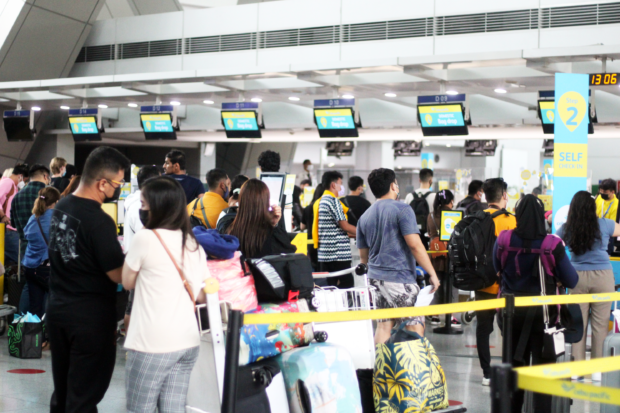Ex-Immigration chief says new, stricter rules go against people’s right to travel

Travelers arrive at the Ninoy Aquino International Airport (NAIA) Terminal 3 in this file photo taken in November 2022. INQUIRER file photo / SAMUEL YAP
MANILA, Philippines — A lawmaker who used to head the Bureau of Immigration (BI) has claimed that the imposition of stricter rules for Filipinos going out of the country curtails the people’s right to travel and their right to privacy.
In a statement on Friday, Cagayan de Oro 2nd District Rep. Rufus Rodriguez said the decision of the Inter-Agency Council Against Trafficking (IACAT) to impose additional and stricter rules on Filipino travelers is both unreasonable and intrusive.
IACAT announced on Thursday that they have revised guidelines for Filipinos leaving the country, which would take effect by September 3. According to the body, they updated the guidelines to fight human trafficking.
“The more stringent rules will unduly interfere with the Filipinos’ right to travel,” Rodriguez said.
“Those are unreasonable rules. They will give Filipino tourists, overseas Filipino workers and other travelers a lot of inconvenience, and they could make them vulnerable to harassment and extortion by corrupt immigration officers and other airport personnel,” he added.
Article continues after this advertisementIACAT said that in addition to basic travel documents — valid passports, appropriate visas, boarding passes, roundtrip tickets if needed — immigaration officers may require tourists to answer more questions and ask for other supporting documents like:
Article continues after this advertisement- Confirmed return or roundtrip ticket
- Proof of hotel booking/accommodation
- Financial capacity or source of income consistent with the passenger’s declared purpose of travel
- Proof of employment and other equivalent documents
Overseas Filipino workers (OFWs) leaving the country for the first time would also be required to bring the following:
- OEC, E-receipt, or OFW Clearance duly issued by the Department of Migrant Workers
- Valid and appropriate employment visa or work permit or any equivalent document
- Employment contract, as necessary
- Visa Usage Undertaking or Manpower Request specifying visa usage approved or verified by the Migrant Workers Office (MWO)
READ: Going abroad? More documents needed, stricter rules to follow starting Sept. 3
Rodriguez also said that by allowing immigration officers to ask more questions, travelers might be put at risk of being extorted just so they can continue with their trips.
“I am afraid that’s where extortion, harassment and corruption will arise,” he said.
“I am sure Justice Secretary (Jesus Crispin) Remulla, who is a good lawyer, knows the implications of the additional regulations on the right to travel and the right to privacy,” he added.
Rodriguez further said that stricter measures might not be a good deterrent to trafficking and exploitation since the digital age allows traffickers to transfer money and information just after victims have crossed borders — rendering the stringent checking useless.
“They are proposing to burn the whole house down to kill or catch a rat,” he said.
“In this digital age and with internet banking, it would be very easy for a trafficker to transfer some funds to his or her victim and for the latter to return the money once she/he clears immigration or reaches her/his destination,” he added.